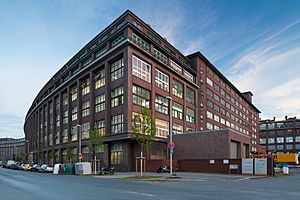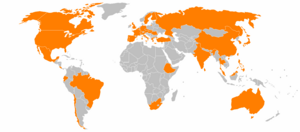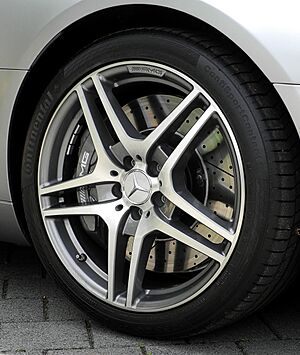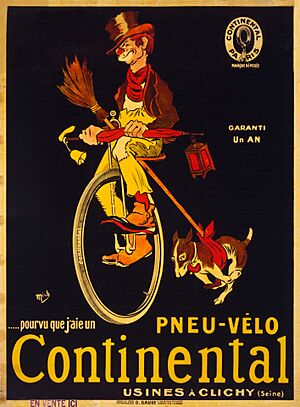Continental AG facts for kids
 |
|

Headquarters in Hanover, Germany
|
|
| Public | |
| Traded as | |
| Industry | |
| Founded | 8 October 1871 |
| Headquarters |
Hanover, Germany
|
|
Area served
|
Worldwide |
|
Key people
|
|
| Products | Tires, brake systems, powertrains, chassis components, automotive safety, vehicle electronics |
| Revenue | |
|
Operating income
|
|
| Total assets | |
| Total equity | |
| Owner | Schaeffler Group (46%) |
|
Number of employees
|
202,763 (2023) |
| Subsidiaries |
|
Continental AG, often called Continental or Conti, is a large German company. It makes many parts for cars and other vehicles. Continental is known for its tires and brake systems. It also makes vehicle electronics and parts for vehicle safety.
The company is one of the biggest suppliers for the car industry worldwide. It is also one of the largest tire makers. Continental sells tires for cars, motorcycles, and bicycles. They sell tires under their own brand and other brands too. Some of these brands are General Tire, Viking, and Uniroyal (in Europe). Major car companies like Volkswagen, Ford, and Toyota use parts from Continental.
Contents
Company History
Continental started in 1871. It began as a company that made rubber products. In 1892, Continental started making bicycle tires that were filled with air. This was a big success for them. By 1904, Continental was the first company to make car tires with grooves. These grooves help tires grip the road better.
In 1905, they invented a special tire that could be easily removed from touring cars. Later, in the 1920s, Continental joined with other rubber companies. They formed the biggest rubber company in Germany at that time.
During World War II
During the time of the Nazis in Germany, Continental, like many other German companies, faced pressure from the government. The company used forced labor in its factories during World War II.
After the War
After the war, Continental continued to grow. In 2001, they bought a big part of Temic, a company that made car electronics. They also bought Phoenix AG, a rubber and plastics company, in 2004. In 2007, Continental bought Siemens VDO, another electronics company.
In 2008, a company called Schaeffler Group tried to take over Continental. By 2009, Schaeffler became a major owner of Continental.
In 2012, Continental was ranked as one of the top global car parts sellers. The company also returned to the DAX index, which lists the top 30 German companies. In 2017, Continental became an official tire sponsor for the Tour de France cycling race.
In November 2020, Nikolai Setzer became the new CEO of Continental. In 2021, Continental invested in a start-up company called Recogni. This company works on new technology for self-driving cars.
In February 2024, Continental announced that it would reduce about 7,150 jobs in its car parts division.
Interior Division
The Interior Division at Continental focuses on car electronics and control systems inside the vehicle. This includes things like the car's computer systems and how you control different features. They have research and development centers all over the world.
The division has several business units:
- Body & Security (for vehicle electronics and cabin control)
- Commercial Vehicles & Aftermarket (for trucks and other large vehicles)
- Infotainment & Connectivity (for car entertainment and internet connections)
- Intelligent Transportation Systems (for smart traffic solutions)
- Instrumentation & Driver HMI (for dashboards and driver controls)
- Autonomous Mobility (for self-driving car technology)
Schaeffler Group Becomes a Major Owner
In 1998, Continental bought a brake and chassis business from another company. Ten years later, in 2008, the Schaeffler Group, a family-owned company, started to buy a large part of Continental. Continental had recently bought a big company called Siemens VDO, and this made them seem a bit stretched.
After some discussions, Continental agreed to the Schaeffler Group becoming a major owner. Schaeffler agreed to own less than 50% of Continental for a few years. This agreement helped both companies work together.
Continental Tire in the Americas
Continental Tire entered the North American tire market in 1987. They bought General Tire, a company based in the United States. This created Continental General Tire Corp.
The main office for Continental's tire divisions in North and South America is in South Carolina, USA. Continental also has a research center in Silicon Valley, California. Here, they work on new technologies, including those for self-driving cars.
From 2002 to 2005, Continental sponsored a college football game in Charlotte, North Carolina. It was called the Continental Tire Bowl.
In 2011, Continental announced plans to build a new tire plant in Sumter, South Carolina. This plant would create many jobs. In 2016, they also planned a large commercial tire plant in Clinton, Mississippi. Later that year, Continental bought Hoosier Racing Tire, a company known for racing tires.
Car Electrical Systems
Continental works on different types of electrical systems for cars. This includes systems for gasoline and diesel engines. They also focus on electric car systems, which are growing fast. Continental helps car makers create more efficient cars that produce less pollution.
Awards for Innovation
Continental has won several awards for its new ideas and technologies in the car industry. These are called the Automotive News PACE Awards.
In 2016, Continental won an award with Honda for their Bidirectional Long Range Communications (BLRC) System. This system lets you use a remote control key fob from far away. You can start the engine and control the car's temperature. It also sends feedback to you, like if the car is locked.
In 2015, Continental won two PACE Awards for its special circuit board technology and a new sensor element. In 2018, they won another award for their Digital Micromirror Head-Up Display. This technology projects information onto the car's windshield.
In 2020, Continental won a PACEpilot award for its Virtual A-Pillar technology. This helps drivers see better by reducing blind spots around the car's front pillars.
Executive Leaders
Chief Executive Officer
- 2009–2020: Elmar Degenhart
- 2020–present: Nikolai Setzer
Chairman of the Board
- 2009–present: Wolfgang Reitzle
Acquisition of Veyance Technologies
Continental AG bought an American rubber company called Veyance Technologies, Inc. in 2015. This company became part of Continental's ContiTech division. This acquisition helped Continental grow its business in North America.
See also
 In Spanish: Continental AG para niños
In Spanish: Continental AG para niños
- Continental Automotive Systems – one of the company's divisions
- Hoosier Racing Tire – part of Continental's racing tire business
- Vitesco Technologies




